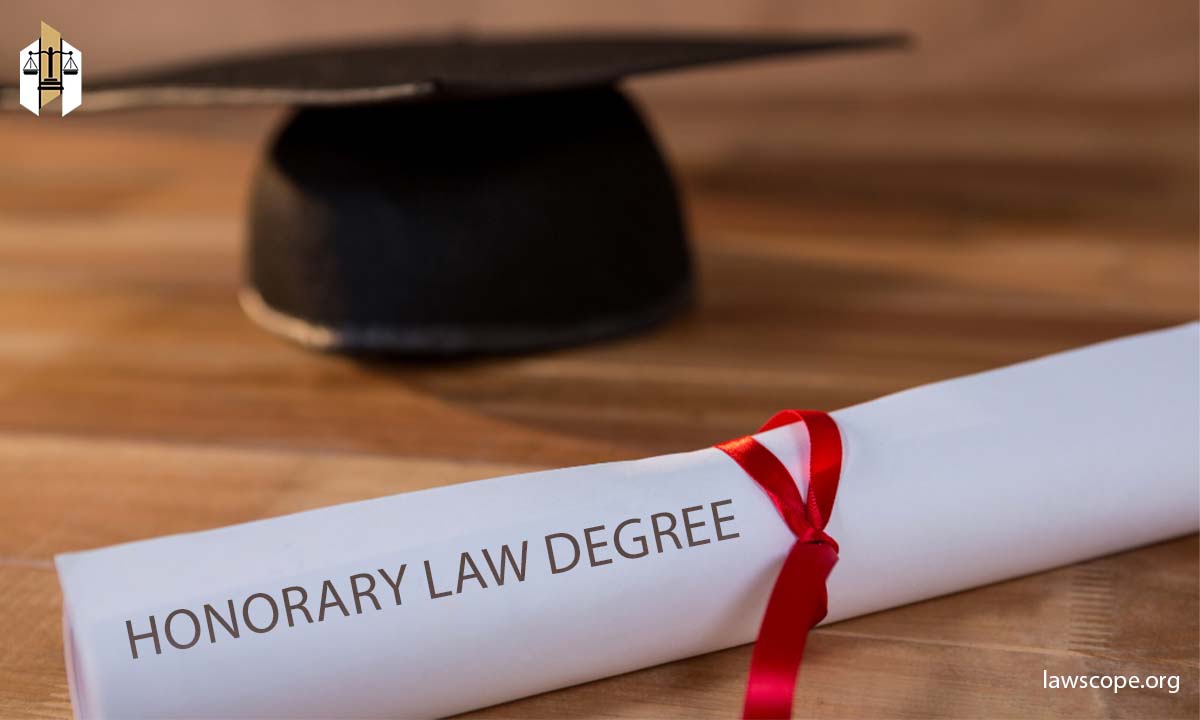
An Honorary Law Degree is such a prestigious award and such a great responsibility.
Therefore, it is essential to know it from within. One should bear the following issues in mind, such as their significance for academia, their nomination, and conferral.
Go deeper into the fellowship of outstanding awardees to understand this issue forefront and get it to stretch!
Whether you’re considering nominating someone or if you’re angling for that Honorary Law degree yourself, diving into the nuances of Honorary Law degrees is an exciting path to furthering your understanding of academic achievement and enforcement.
In this blog, we’ll take a closer look at Honorary Doctorates in law.
Where do they originate, how are they awarded, and what do they suggest for both their recipients and their interest group?
What Is An Honorary Law Degree?

An Honorary Degree is a diploma awarded to an individual or a group of individuals who have made a significant contribution to society, educational institutions, or the world.
Most Honorary degrees are awarded to presidents, heads of state, famous people, scientists, and jurists.
Honorary Doctorates, particularly in the area of law, have a special place in the academic community.
These degrees are awarded to those who have made outstanding contributions to society. Not only are they honorary degrees, but they also represent a great deal of respect and appreciation.
Can someone get an honorary law degree?
Absolutely yes!
Can you practice law with an honorary degree?
An Honorary Doctorate of Laws does not entitle the doctorate holder to practice law unless they have obtained a Graduate Degree in Law.
An Honorary Doctorate is also awarded to distinguished individuals for their accomplishments.
Did Trump get an honorary law degree?
Yes, he did.
Check out this list of honorary law degrees and how Trump has an honorary law degree.
What Is The Selection Process Of The Honorary Law Degree?
The procedure for filing an Honorary Doctorate in Law is complex and takes a long time.
Most universities and colleges have special commissions by which the candidates are nominated for outstanding contributions to the field of law or even their services to society.
To complete this sub-task, you’ll need to:
1. Collect The Required Documents:
Recalculate your resume, purpose statement, and other required documents for your application. These documents may include recommendation letters, academic transcripts, or certificates of achievement.
Ensure all documents are current and reflect your qualifications and experience.
2. Thoroughly Check The Application Guidelines:
Please take the time to read through the instructions provided by the institution/organization offering the Honorary Doctorate in Law.
Be sure to read through any specific requirements or guidelines for the application process.
For example, formatting guidelines, word limit, or additional documents to include.
3. Create/Update Your Resume:
Write or revise your resume to include your education, professional background, and professional accomplishments.
Customize your resume to focus on your legal knowledge and any important work you have done. Make sure your resume is organized, concise, and fault-free.
4. Put in a Statement of Purpose:
Write a powerful mission statement that explains why you applied for the Honorary Doctorate in Law.
Tell us why you love the law, what you want to achieve in your career, and how this honor would benefit you professionally.
Be honest, clear, and convincing.
5. Organize The Supporting Documents:
Organize all required paperwork, such as recommendation letters, academic transcripts, or certificates.
Select referees who can give strong confirmation of your credentials and ask for help as soon as possible.
Make sure all documents are readable, scanned correctly, and meet the required standards.
6. Review All Documents and Proofread Them:
Before sending in your application, review everything you have written. Make sure there are no spelling or grammar mistakes and that all your information is correct and complete.
You may also want to ask a friend or mentor for their advice on how to make your application look professional.
7. Submit Your Application:
Please refer to the application guidelines for instructions on how to submit your application. You can submit your application online using a portal, send it by email, or mail it in hard copy.
Be sure to keep in mind the submission date and any additional requirements, such as including a cover letter or completing an online form.
8. Confirm The Receipt:
Once your application has been submitted, you may want to contact the institution/organization to verify that they received your paperwork.
This can help prevent your application from being overlooked or lost.
Honorary Law Degree Abbr/Honorary Law Degree Crossword Clue
Are you perplexed by the Honorary Law degree: Abbr Crossword clue? We have identified 3 possible solutions for this clue.
The most probable solution for this clue is LLD with three letters followed by SQ and OHMS.
If you are looking for a different clue length or letter combination, don’t worry, we have you covered.
Just search for your crossword clue on the internet and in a few seconds, you will have access to a large number of possible solutions.
Whether you are looking for the answer to a New York Times crossword, a Universal crossword, a Daily Themed crossword, a La Times Daily crossword, or any other puzzle, the internet has a million crossword answers that are collected from various publications.
Explore a whole new world of crosswords with the easy-to-use crossword clues!
Final Thoughts
It’s important to understand the difference between an honorary law degree and an earned one.
An honorary degree gives recognition, but it doesn’t have the same privileges as an earned degree.
Understand the symbolic value of an honorary degree and its potential limitations.
Make sure you understand the legitimacy of an honorary title and the institution that awards it.
Be transparent about the expectations and implications of an honorary title.
Be informed, weigh the advantages against expectations, and consult legal professionals if necessary.
Accept the honor with humility.
An honorary title may improve your reputation, but true legal knowledge comes from years of study and practice.
Learn more about the nuances of an honorary law degree before proceeding to apply.
You May Like Also:


